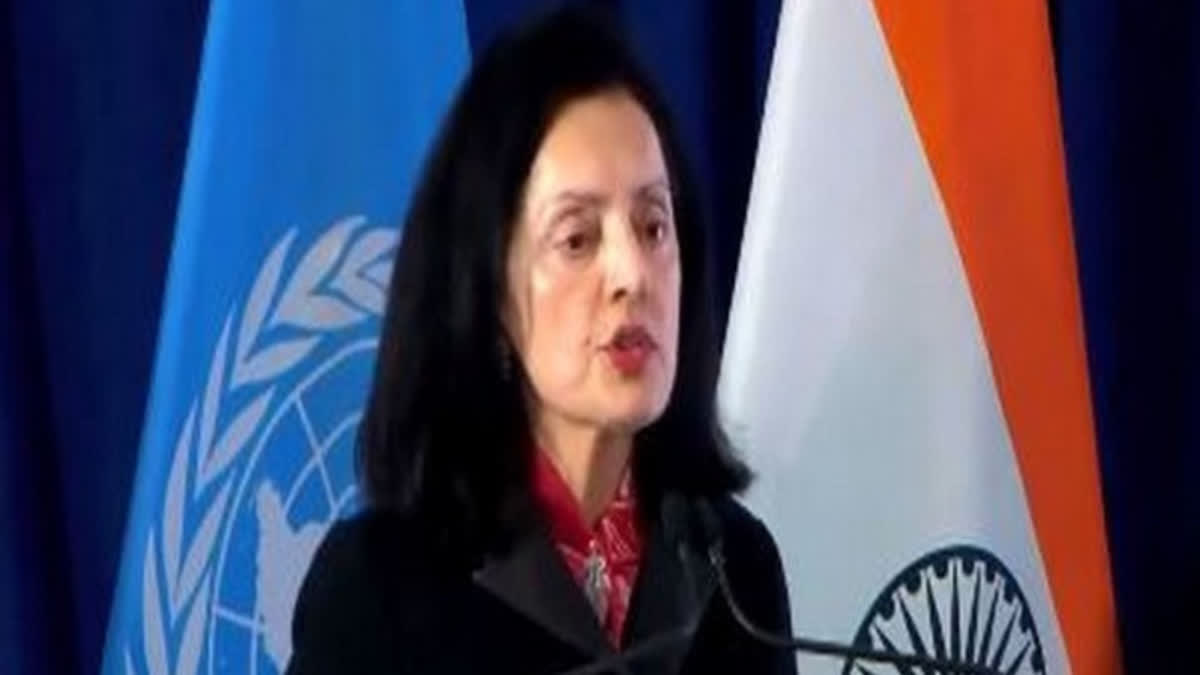New York : India's strategic position enables it to engage with various power blocs constructively and its ability to navigate complex diplomatic waters showcases the country as a potential mediator in international conflicts, the country's envoy to the UN has said.
"In an era marked by rapid changes and complex challenges, India emerges not just as a nation of immense diversity and cultural richness, but also as a key player on the international stage, embodying the principles of cooperation, peace and mutual respect, India's Permanent Representative to the UN Ambassador Ruchira Kamboj said here.
Kamboj delivered a special address on the topic India in the Emerging Global Order' at the India: The Next Decade' conference hosted by the Deepak and Neera Raj Center at Columbia University's School of International and Public Affairs last week. Kamboj said India's ancient philosophy of Vasudhaiva Kutumbakam' the world is one family - positions the country uniquely as a mediator and conciliator in world affairs.
In recent years, the international community has witnessed India's proactive approach to fostering dialogue and understanding across diverse nations, she said in her prepared remarks. Moreover, India's strategic position, coupled with its non-aligned history, enables it to engage with various power blocs constructively," she said.
"India has shown that it is possible to maintain friendly relations with countries having differing ideologies and governance models. This ability to navigate complex diplomatic waters showcases India as a potential mediator in international conflicts, she said at the conference attended by policy experts, students, economists and academicians.
Kamboj also underlined that India's G20 presidency, which culminated in the Leaders' Summit in Delhi in September and the unanimous endorsement of the New Delhi Leaders' Declaration, showcased the country's capacity to navigate a complex geopolitical landscape, achieving consensus among diverse viewpoints.
Kamboj's remarks come at a time when the world grapples with myriad challenges, including the recent Israel-Hamas conflict and the prolonged Ukraine war, and global bodies such as the UN Security Council, tasked with the maintenance of international peace and security, have remained divided and ineffective in dealing with these challenges.
In her address, Kamboj noted that the UN has not been able to deliver on its mandate due to its inability to adapt itself to a rapidly changing geo-strategic and geo-economic environment. She reiterated that the issue of urgent UN reforms can no longer be put on the back burner and the process cannot be completed without the composition of the Security Council changing to reflect contemporary realities of the 21st century.
The world also acknowledges that India's claim for the membership of the Council cannot be disregarded for long.By any objective criteria, such as population, territory, GDP, economic potential, civilisational legacy, cultural diversity, political system and past and ongoing contributions to the activities of the UN especially to UN peacekeeping operations India is eminently qualified for permanent membership of the Security Council, Kamboj said.
At present, the UNSC comprises five permanent members and 10 non-permanent member countries which are elected for a two-year term by the General Assembly of the UN. The five permanent members are Russia, the UK, China, France and the United States and these countries can veto any resolution.
In his introductory remarks, Columbia University Professor and former Vice Chairman of NITI Aayog Arvind Panagariya highlighted India's growth trajectory and potential to soon become the world's third-largest economy, which he said will have a huge symbolic effect on the country's position in the global order.
He noted that in 2014, India was the world's 10th largest economy, and in the last decade, it has moved up to the 5th largest status.
But this, too, will change within the coming three years. By the end of 2026, India will likely become the world's third-largest economy, he said adding that as of 2022, Japan is the third largest economy, with a GDP of USD 4.2 trillion, and Germany is the fourth largest with a GDP of USD 4.1 trillion. Panagariya said that in 2023, Japan is predicted to see a decline in its GDP and Germany's GDP at the end of 2026 will be at most USD 4.95 trillion.
India will be competing against this figure. Now, from 2003-04 to 2022-23, despite two major crises (the global financial crisis in 2008 and the pandemic in 2020-22), India has grown at an average annual rate of 10.2 per cent in current dollars," he said.
He added that as no such crisis is likely in the coming years, "conservatively, India can be assumed to grow at a rate of 10.2 per cent per year in current dollars in the next several years. At this rate, India will grow from USD 3.4 trillion in 2022-23 to a little above USD 5 trillion. That would place India in third place, behind only the USA and China. This will have a huge symbolic effect on India's position in the global order."
Read More
Share collective angst of Global South countries of not having voice at UNSC high table: India



